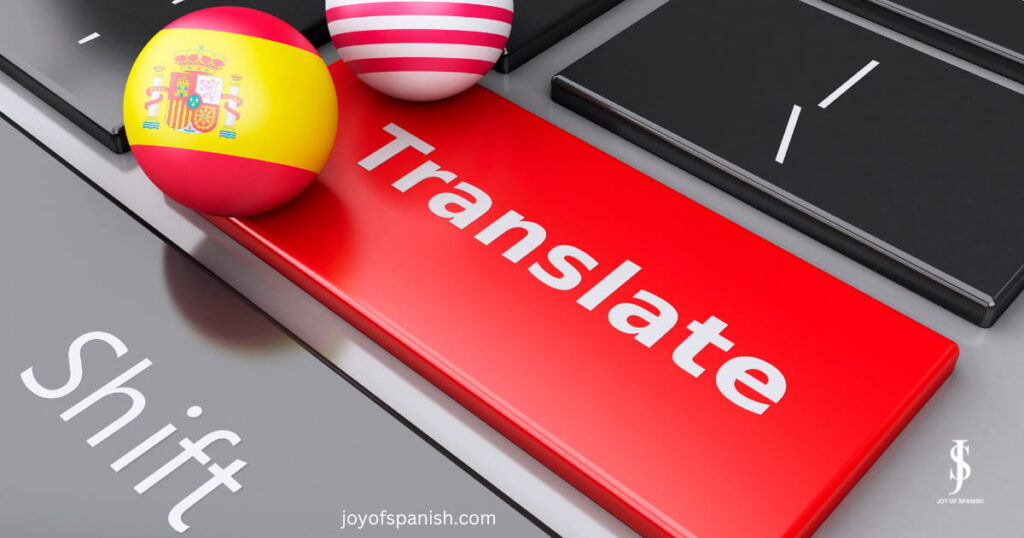If you’re learning or interested in learning Spanish, working as a translator could be your top wish. Those passionate about foreign languages, including Spanish learners, often work towards this goal.
Communication is not the only point that attracts Spanish learners from far and wide.
There are other motivations to learn Spanish. This includes dramas, movies, music, songs, dance, and various cultural factors. And then there are tons of job opportunities for people who speak Spanish.
As an effect, Spanish is becoming a popular language to learn. With over 500 million native speakers, it ranks third in the most spoken native languages globally.
Spanish-speaking countries have thriving markets and entertainment industries. Thus, Spanish is helpful and opens up job options in various sectors.
Among the options, you have the Spanish translation. A career as a translator is an incredible choice. And why not, as it offers a high income and flexibility.
Those pursuing higher-level Spanish will find this intriguing. It’s natural to question what it takes to join this profession.
What are the advantages of having Spanish language skills for a successful career in translation? What are the likely earnings, various work profiles, and where can you find job possibilities?
This article will thoroughly cover every aspect of the Spanish translation job. It’s time to get started.
Table of Contents
What does a Spanish translator do?

A Spanish translator converts written content, documents, or text from one language (source) into another (target). This could be your Spanish, your mother tongue, or another one you are proficient in.
No matter what language combination, you must know two languages. It requires a near-native or an advanced ability level in both, including Spanish.
For example, you may know Spanish as a second and Korean as a native tongue. Then, you would translate Spanish into Korean and vice versa. It depends on your language abilities and how good you are in a particular mix.
Their primary role is to ensure you accurately convey the language’s content flow, context, meaning, and style.
Translators must be culturally sensitive and aware of contrasts between the source and the target language.
There are many key responsibilities and tasks for a Spanish translator. This comprises confidentiality, maintaining quality and exactness, following the deadline, etc.
Translating is critical in most business meetings, conferences, live events, and international seminars. It is important to know every detail before trying to solve the problem.
Can machines replace human translators?
The answer is no, in short.
Machine translation has made significant advancements in recent years. Still, it has yet to reach a point where it can fully replace human translators for all types of work.
Artificial intelligence and neural networks often power machine translation. This can be highly useful in certain situations but has limits.
Many clear benefits include easy availability, cost-efficiency, speed, and consistency. But it fails in many critical things.
For instance, the machine struggles with context, idiomatic phrases, cultural nuances, and contexts. It also needs more creativity.
Plus, we have complex language structures. It usually gives literal translations that may not capture the intended meaning.
Further, it does not produce sound output with specialized or technical subjects. That is because it needs domain-specific knowledge and experience.
The quality also varies wildly, depending on the topic and language. This is acceptable for informal communication. But it often needs more professional, high-stakes content.
It also may pose security risks for sensitive or confidential information. This results from the content passing through external servers or databases.
Machine-generated translations need human post-editing. This is to ensure better accuracy and readability. As a result, this negates some initial time and cost savings.
In recap, machine translation has its place. It is a valuable tool for some tasks, especially when speed and affordability matter.
Yet, it cannot replace human translators for tricky, nuanced, or culturally exposed content. A deep understanding of language, context, and customs is paramount here.
That is why the demand for professional Spanish translators remains high worldwide. They play an integral role in meeting challenging and mission-critical needs.
What makes it different from interpretation?
Translation and interpretation are linguistic processes that involve converting one language into another. Both are distinct but fall within the broader realm of language services.
They differ in the medium, mode of communication, and specific skills required.
Translation and interpretation have one key difference.
Translation deals with written text and allows for careful review and revision. At the same time, interpretation involves spoken communication and needs real-time skills.
Both professions demand language expertise and cultural insight.
An interpreter’s job is more complex than a translator. The same is reflected in their salaries, as they are paid relatively more.
This is because interpretation often works in real time. It needs native-level skills, more accuracy, and proactivity. They don’t get access to helpful tools and time to research.

The different types of translation
Translation is a diverse field. You can restate many sorts of texts.
There are several common types of translation services. Each serves specific objectives and necessities.
There are three broad categories. Let’s find it all in detail.
(i) The General Translator
These translators are the first ones to join the profession. As an outcome, they are commonly called “generalists” or “general translators.”
The work does not need any specialized content.
You need little experience or expert knowledge to understand. The task is manageable for any professional translator.
The text may still contain different dialects of Spanish, slang, and technical terms. This can be tough. But most people can comprehend it with some effort and research.
The services and product details are typical business information. This translation group includes the website’s content, social media, and non-technical reports.
(ii) Specialized translator
This type of translation needs a specialized translator as well as general requirements.
The time needed to achieve advanced level Spanish depends on various factors. It can take 2 to 5 years to become a translator. Also, gaining authority in technical fields takes time and effort.
Specialized translations come in various types. E.g., medical, marketing, technical, legal, financial, scientific, travel, business, and software localization.
Today, there is a growing popularity of TV shows and films for Spanish learners. This has led to a massive increase in multimedia content.
Voice-overs, dubbing projects, subtitles, and scripts are highly sought after. There is also a growing demand for Spanish songs and music.
The work areas comprise translation, transliteration, and audio-related things. These markets have been on the rise in recent years.
Are you fond of reading literary pieces?
With your native language, you can translate texts from Spanish. This includes short stories, poems, plays, essays, articles, literature, history, and artistic texts.
Research, self-help, and science have a large market for conversion. So, there is plenty of job scope in the ever-growing publishing industry and educational books.
Each work profile needs unique skills, expertise, and methods. Translation agencies specialize in many fields to offer quality and custom services to their clients.
(iii) Transcreation
The purpose of transcreation is to transform content from one language to another.
The tone, intent, context, purpose, and style stay the same using this approach. Also, the sentences remain unchanged in this method.
Translators can use innovation to improve content by tapping into their cultural familiarity. The aesthetic appeal will draw a larger audience to this.
This way of presenting the text makes it easier for the reader to understand. There are, of course, many elements that contribute to that.
Language-based discussions make localization, marketing, and cultural nuances more engaging.
Copywriters provide most of these services. Creative translators can support and complete these tasks. Their pay is higher than that of translators.
What is the career prospect for Spanish translators?
Choosing translation as a profession is exciting for many reasons. So, let’s take a closer look at this!

1. Flexibility is a positive aspect of freelancing
Freelance Spanish translation enables a relaxed lifestyle.
Self-employment is common in this profession. This is one thing that makes this language-related career so satisfying! You can be in charge of your schedule and be your own boss.
Innovative technology and fast internet can pave the way for successful employment. Doing it anywhere at your convenience makes it so cool.
With a fixed plan, time management is unnecessary. You can pick your workspace, working hours, and pay rate. You have a more easygoing work timetable.
Let’s say you have a translation job that might take 50 hours. But now you can finish your hours at your own speed.
You can work on it for as long or as little as you want each day or week as long as you finish it before the last date.
While they get what they want, you do things your way and earn money.
2. Hard work can lead to plenty of money
There is a high request for Spanish translators in the market. The need is rising in every country because of cross-border trade and expanding business to cater to the global market.
Skilled translators are always in high demand. They earn more because of their expertise, domain, and experience.
Translators make a higher average salary than other language-related jobs. As a result, an increasing number of candidates are aspiring to become Spanish translators.
Among languages other than English, Spanish is one of the top choices. Mixing with less popular languages can make your resume noticeable. But you may receive fewer job chances.
The rise of Hispanic regions on the global business stage is a notable reason for the outstanding pay for translators.
Income for freelance translators relies on the task, page, word count, or hourly rates. If you opt for a full-time assignment, you will get weekly or monthly pay, depending on your schedule.
3. You’ll gain relevant and valuable skills
There are many things you will discover as a translator.
You will enhance your editing, writing, and grammar skills. Plus, you’ll broaden your word list.
You will also improve your understanding of Hispanic people and cultural sensitivity. You will also know industry-specific facts.
Business owners can develop a clientele, approach customers, and manage programs. You will be good at multitasking and managing many tasks at once.
You’ll have to know the technical details. You also learn how to manage various software and Spanish language learning apps as part of your job. It’s fruitful to have technical familiarity with digital products.
Drawbacks of being a translator
Just like anything else, there are some downsides.
First, there is no guarantee of work. Income fluctuations are also typical.
The job of a translator often involves short-term contracts. Having freedom and flexibility can be worthwhile. Despite this, you face stressful tasks and deadlines.
To impress clients and maintain your reputation, you need to work hard.
It is also possible that you won’t get the job you want regularly. Freelancers are prone to undergoing extended periods of no work. Spanish translators face that issue.
There has been progress in machine learning. The scenario has sparked concerns about future job prospects for Spanish language translators.
Machine translators are unlikely to replace human translators. Even so, online translators like Google and Bing Translates are effortless.
Some companies hire translators when they need them for urgent or mission-critical work. There is still a lot of work available for trained professionals.
Translators may someday experience boredom. Only a select few can handle the repetitive work and staring at the computer non-stop, which is the nature of the job.
If you hunger for creativity, there may be a more fitting career option. Although there are some flaws, translators are more profitable than known shortcomings.
How can one become a Spanish translator?
For language learners, translating is the perfect career path. And it makes sense for various reasons.
Translators receive higher pay than most other jobs.
Working and traveling from anywhere also provides an edge. Spanish being straightforward, you can quickly improve your Spanish skills, too.
What actions need to be taken to make it a reality? Here are four crucial standards and necessary skills.

1. Qualifications needed for translators
To become a translator, having a bachelor’s degree is required. But there is no obligation to have a specific degree or variety of subjects.
Learning and improving languages during school or college is the best way to become a translator.
A Bachelor’s and Master’s degree in Spanish can pave the way for Spanish translators to have a full-time occupation.
Translators can also pursue customized certification courses. You can do this once you achieve a higher level of mastery. For instance, B2 or C1 of SIELE.
You should also know industry standards, specific details, and language talents. Your closeness with technology, nuances, technical information, and manners will also be practical.
2. Having a superior level of Spanish proficiency
Translators need to be highly skilled in at least two languages. The highest level in official language exams is near-native or the most advanced.
Even if Spanish isn’t your mother tongue, you can find work that calls for it.
This study includes more than just grammar. Spanish studies involve reading newspapers, watching TV series to learn Spanish, reading books, etc.
You’ll gain a greater understanding of the Hispanic globe. As you become more familiar with the language, your experience will become more profound.
To become a Spanish translator, you must aim for the highest proficiency level. Continue refining your language abilities until you reach an advanced level.
You must be fluent in at least two languages. Thus, it is advisable to have a native or CEFR level of C1/C2 of DELE in a similar reference system.
Enrolling in a long-term Spanish program at a university might be a good choice. To set yourself apart, register for a personalized translation program.
Studying on your own or with a tutor can lead to official diplomas. Employees usually verify and ask for Spanish abilities through reliable documents.
DELE or SIELE diplomas show your fluency level. You’ll have a better chance of getting hired as a translator.
3. Skillful writing and translating abilities
Do you have a natural aptitude for the target language and top-notch writing abilities? If this is true, opting for translation would be an intelligent decision.
There’s no space for insincerity, negligence, and incompetence.
Knowing a language isn’t enough for excellent translation.
Even if you are skilled in Spanish, you must work on interpretation skills. Fluency in two languages is one of the many criteria for success in translation.
Adapting to diverse writing styles and having strong writing skills according to the situation is also essential.
4. Building contacts, networking, and referrals
Almost every company relies on translation to succeed. There are better ways to find these options than online job boards and classified ads.
A strong resume and a network of contacts can encourage you to achieve success.
As a freelance translator, improving your connections can be beneficial. Having many references will assist you more in the long run.
Creating an online profile on a job site is one way to fulfill that. Business networking websites like LinkedIn allow you to contact HRs and recruiters.
You can also connect with experts in the industry to widen your links. You can send your CV directly if you wish to work for a specific company.

How do I get the translation project?
Employers offer software that allows for computer translations. This can help you complete your duty. Thus, you can work remotely, which is simple and workable.
You can operate from any device, no matter where you are.
It is common for translation firms and service providers to engage Spanish language experts.
When making a list of agencies to contact, refrain from spamming them. It may be more helpful to browse their websites.
Are you planning to work as a freelance translator in a competitive market?
You’ll need marketing and business skills if that’s the case. The greater your education and language experience, the better.
Having solid contacts can make a big difference for those in the field of translating Spanish.
How much can a Spanish translator earn?
It’s widely known that a great paycheck is a top motivator in this profession.
Salaries for translators differ. Language skills, job experience, and type of work are among the factors that influence pay.
Location and language combinations are equally essential to consider. For instance, higher-level Spanish language tests and backgrounds can drive a higher paycheck.
Think about translating, transcribing, or transcreating less common languages. You’ll earn more than a translator of well-known languages.
If you work for an organization, you can expect a decent salary. Word count, page count, and project size are the factors that decide the price for freelancers.
Final Words: Could translation be a career for you?

A career in translation might be demanding for you to imagine if you speak Spanish.
Success results from hard work and big dreams. No matter how much inspiration and persistence it takes, keep trying!
Becoming a translator could be rewarding if you have a strong work ethic and a love for Spanish. Weigh both the benefits and drawbacks before making a choice.
Translators are one of the most favored professions among Spanish learners.
There are reasons, such as high salaries, expanding work, and flexible hours. You can also consider if you are passionate about the Spanish-speaking world.
Would you like to pursue a career as a Spanish translator? You can write your opinion and questions in the comments below!







